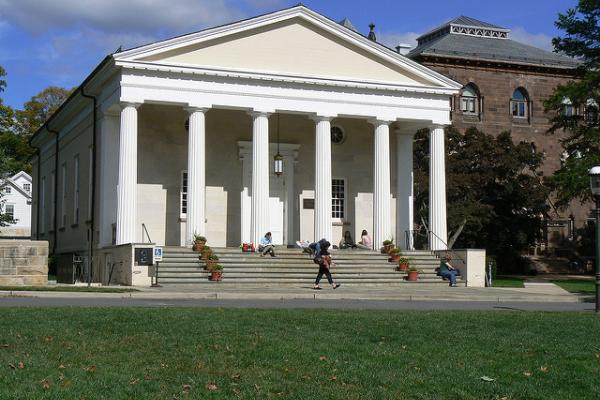The president of Princeton Theological Seminary on Wednesday said the school reversed its decision to award the Kuyper Prize to Rev. Timothy Keller following concerns over the New York PCA pastor's views on LGBTQ persons and women's ordination. The Kuyper Prize, offered by the Abraham Kuyper Center for Public Theology, is awarded for “Excellence in Reformed Theology and Public Witness” and includes both an invitation to speak at the seminary and a $10,000 award.
“It is not my practice to censor the invitations to campus from any of our theological centers or student organizations,” seminary president Craig Barnes said in a letter addressed to the seminary community. “Yet many regard awarding the Kuyper Prize as an affirmation of Reverend Keller’s belief that woman and LGBTQ+ persons should not be ordained… In order to communicate that the invitation to speak at the upcoming conference does not imply an endorsement of the Presbyterian Church in America’s views about ordination, we have agreed not to award the Kuyper Prize this year.”
Criticisms of Keller’s selection as the 2017 award recipient arose as soon as the announcement was made. Tim Keller is a well-known conservative Christian writer and the founding pastor of Redeemer Presbyterian Church in New York. He is also a prominent leader in the Presbyterian Church in America, which formed as a reaction to progressivism within the church and does not support the ordination of women or LGBTQ people. Princeton Theological Seminary is an institution of the Presbyterian Church (U.S.A.), which ordains both women and LGBTQ people.
Critics of Keller’s selection affirmed the importance of hearing ideologically diverse voices, but pointed out the harm in celebrating and rewarding someone who does not support the ordination of a significant portion of the seminary’s student body.
Students and alumni sent letters to President Barnes protesting the award decision, and many signed on to a letter authored by the Center for Theology, Women, and Gender Advisory Council and Women’s Center as well as BGLASS, the seminary’s LGBTQ group:
We respectfully ask: if this seminary is committed to training up the whole body of Christ for ordained ministry and service to the church, how can it honor its commitments to these ideals while also honoring a pastor whose own ministry and practice stands in direct opposition to them? If the student body is nearly forty percent women, and also includes LGBTQ students, how can Princeton Theological Seminary bestow such a significant honor upon someone who denies their call to ministry? What might Princeton Theological Seminary communicate about its values by honoring Rev. Keller with upwards of a $10,000 prize?
pasted_image_at_2017_03_22_12_29_pm.png

Students also organized a “preach-in” to occur on April 6 for the hour before Keller’s lecture, which would feature preachers who are women and/or LGTBQ future pastors. The event is scheduled prior to Keller's talk offering people the opportunity to attend both if they so choose.
Student Cara Dost has also designed a T-shirt to be worn that day which is currently being sold to both current students and supporters.
While Keller will no longer receive the Kuyper Prize, he will still present his lecture as scheduled. As of now, the preach-in is still scheduled to occur as well.
Read President Barnes’ full letter below:
Dear Members of the Seminary Community,
On March 10 I sent a letter to the seminary community addressing the emerging objections to the Kuyper Center’s invitation to the Reverend Timothy Keller to speak at their annual conference and receive the Kuyper Prize. Those who are concerned point to Reverend Keller’s leadership role in the Presbyterian Church in America, a denomination which prevents women and LGBTQ+ persons from full participation in the ordained Ministry of Word and Sacrament.
As I indicated in my previous letter, it is not my practice to censor the invitations to campus from any of our theological centers or student organizations. This commitment to academic freedom is vital to the critical inquiry and theological diversity of our community. In talking with those who are deeply concerned about Reverend Keller’s visit to campus, I find that most share this commitment to academic freedom. Yet many regard awarding the Kuyper Prize as an affirmation of Reverend Keller’s belief that women and LGBTQ+ persons should not be ordained. This conflicts with the stance of the Presbyterian Church (USA). And it is an important issue among the divided Reformed communions.
I have also had helpful conversations about this with the Chair of the Kuyper Committee, the Chair of the Board of Trustees, and Reverend Keller. In order to communicate that the invitation to speak at the upcoming conference does not imply an endorsement of the Presbyterian Church in America’s views about ordination, we have agreed not to award the Kuyper Prize this year.
However, the Kuyper Center’s invitation to Reverend Keller simply to lecture at their conference will stand, and he has graciously agreed to keep the commitment. We are a community that does not silence voices in the church. In this spirit we are a school that can welcome a church leader to address one of its centers about his subject, even if we strongly disagree with his theology on ordination to ministry. Reverend Keller will be lecturing on Lesslie Newbigin and the mission of the church – not on ordination.
I want to thank all who have communicated with the administration of the seminary as this important conversation has unfolded on campus. We have heard many heartfelt perspectives from both sides of the debate. It has been a hard conversation, but one that a theologically diverse community can handle.
In the grace and love of Jesus Christ, we strive to be a community that can engage with generosity and respect those with whom we disagree about important issues.
Sincerely,
Craig Barnes
M. Craig Barnes
President, Princeton Theological Seminary
Got something to say about what you're reading? We value your feedback!
